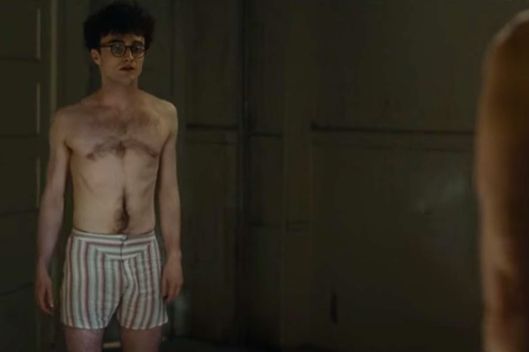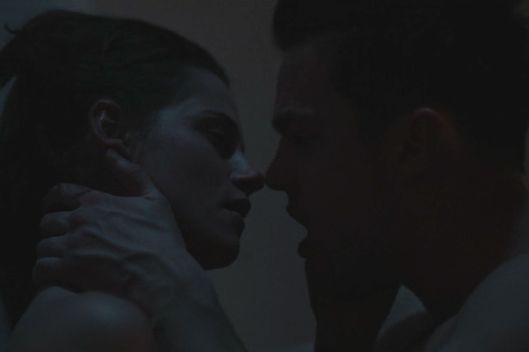How To make A Bed Scene with Gay Sex Virgin Daniel Radcliffe

John Krokidas, Kill Your Darlings
In his first big post-Potter sex scene, Daniel Radcliffe plays the writer Allen Ginsberg as a young college student on a voyage of self-discovery: Obsessed with the beautiful best friend (Dane DeHaan) who strings him along, Ginsberg ultimately strikes out on his own and loses his virginity to a man he meets in a bar.
Growing up with queer films, there was always some sort of stigma attached to gay characters or gay sexuality, and I didn't want the sex scene to feel like that in any way. I wanted the arc of the scene to go from nervousness to a place of pure enjoyment to a realization that this would ultimately become a formidable part of his identity. Allen Ginsberg was one of the most renowned gay artists of the 20th century, and I felt that not including his sexuality as part of the story would be a crime. He wore it unabashedly on his sleeve and helped establish queer sexuality as something you could even talk about in art and literature, so the scene was incredibly important to capture right.
Dan had no issue with doing the scene whatsoever. His only question was, "Just so I know, how naked do you want me to be … movie-naked, or Equus-naked?" I said, "I hate when people block sex scenes in order to play hide-the-genitalia — that feels so forced. So let's just block it, and if it falls into frame, we'll shoot it." But then I remember going, "Oh shit: You're British, and Allen Ginsberg is one of the most famous Jews of the 20th century. On second thought, I don't think we're going to go Equus-naked." And Dan said, "John, my mother's Jewish and I'm circumcised. Play the scene any way you want.” God bless Daniel Radcliffe, he commits to all of his actions.
I knew we needed to nail the blocking. If we got that down and rehearsed it enough times with clothes on, there would be less time having to put two naked men in awkward positions with certain body parts pressed up against each other in a way that would make the actors feel self-conscious. I could tell people were getting a little bit nervous and antsy, so in my attempt to bring some levity to the situation, I said, "Let's do this with stand-ins, and I'll be one of the stand-ins." And I asked Reed Morano, my cinematographer — I was very close to her by that time — to do it with me.
They always say to directors that your actors will follow you if you do whatever you're asking them to do, and ultimately, it was really helpful: By doing it ourselves, we could show the actors exactly what we needed from their blocking … although I thought that when I was the top and Reed was the bottom, it could look a little wrong, gender-wise. So I let her take the dominant position, and in the middle of this blocking, with my legs in the air and Reed on top of me, that was when I really realized we were feigning intercourse in front of our entire crew. We both looked at each other like, Is this the moment we're always going to remember from this set? But it's also the moment that cemented our friendship. Once you've simulated sex with your director of photography, what else do you have to hide from each other?

Drake Doremus, Equals
In a futuristic world where sex and emotions are verboten, Silas (Nicholas Hoult) feels unfamiliar stirrings that he comes to realize are feelings for his co-worker, Nia (Kristen Stewart). When the two of them finally get together, neither person has so much as kissed someone before, and their first rendezvous is a liberation.
First and foremost, I approach the scene from a voyeuristic standpoint. I'm guiding the actors by making them feel like they're completely liberated and in the moment, so that risks are okay. Rather than saying, “Stand here, touch her here, do this,” it's more of an exploration, and the intention is that they should lose themselves and let the scene sort of take over. If we've done our job right, it should feel like maybe we shouldn't even be there because it’s so intimate and personal.
For Kristen, the direction was pretty simple: You know you can't touch him, you know you can't be touched by him, but then there’s this exhilaration. So it’s a really interesting arc in that scene, and I'll guide those specific beats, but everything in between those moments is completely and utterly about the exploration of getting to those moments. A lot of it has to do with how we schedule the shoot, to be honest. This scene in particular, we'd been shooting for weeks, and they really hadn't touched at all until this moment. The anticipation and the tension boiling over between them just naturally finds its way into the scene, so sometimes you can just schedule things so that they pop at the right time, you know? You want to get something when it's at its fever pitch.
Music is a huge part of it as well. Oftentimes I'll be playing music just before a take if it's a dialogue scene, or even during a take, if sound doesn't matter. I'll just hide a speaker in a cupboard or in a wall and the actors won't even know it's there on the first take, and then all of a sudden, we start rolling, and music will come up. I'm kind of DJing from the monitor, so it's almost as if I'm directing them if they just follow the music, in a way. So there's little tricks and things like that.
I’m more interested in textures and skin and eyes and looks and moments, rather than all-out nudity. To be honest, on my other film, Like Crazy, we shot a lot more explicit stuff and once we got in the edit room, it just didn't find its way in. To me, a love scene isn’t really about the sexual nature of their experience — it’s a lot more about the emotional experience. It’s about realizing what it’s like to fall in love.
Kyle Buchanan
Vulture
Kyle Buchanan
Vulture

Comments